
Buying a home is an exciting time. You often fall in love with the layout and aesthetics of the home, but it’s important to look at the mechanics of the home as well to avoid major problems. The HVAC system is an important part of keeping your home comfortable and safe. It’s an expensive system to replace, so having HVAC questions for the home seller ahead of time is a good way to find out if the system is in good shape.
Bring a list of HVAC questions you should ask when buying a home to ask the realtor, seller or home inspector.
Importance of Home Inspections
No matter how many questions you ask, having a home inspection done gives you a better picture of the overall condition of the HVAC system and other mechanical components of the home. The home inspection is an important part of the buying process.
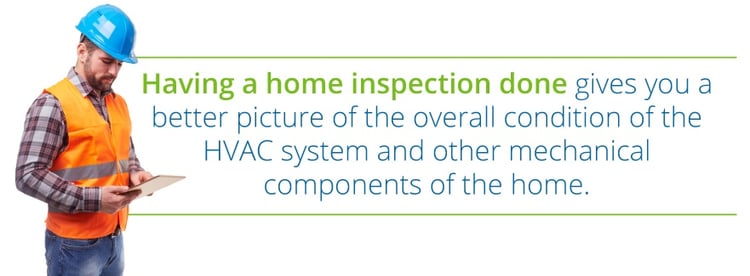
Finding potential problems in the HVAC system helps you correct those issues or ask the seller to correct the issues to keep your new home comfortable. The inspection can also reveal potentially dangerous issues, such as gas leaks or improper installation.
Consider these reasons for having a home inspection:
- Expertise and tools. Many potential issues aren’t visible on the surface. A home may look sound to you, but a professional home inspector has the tools and knowledge to spot potential problems below the surface. The average homebuyer may look at an HVAC system and think it seems fine. An inspector can spot red flags with the system that you’ll want to know before you sign the dotted line.
- Life expectancy of components. Over time, the roof, HVAC system, appliances and other home components need to be replaced. The inspector can give you an approximate timeframe for when those items will need to be replaced, which helps you plan for future expenses.
For example, if the inspector finds an installation or operation issue, you may find out that the system will likely need to be replaced within a few years. Adding the expense of a new HVAC system shortly after buying a new home can be overwhelming for some people.
- Severity of problems. Most homes have some issues, but the severity and cost associated with repairing those issues vary significantly. A home inspector can tell you the potential effects of the issue and which issues need to be fixed immediately. This gives you an idea of what you’re getting into when it comes to the HVAC system and its repair and maintenance needs.
- Suggested repairs. Home inspectors can recommend a course of action for problems in the home. This gives you an idea of the scope of the project before you commit to the home. You may discover a strange noise made by the HVAC system during the inspection is relatively minor and inexpensive to fix, or you may discover the entire system needs to be replaced.
- Negotiation power. If the inspector does find something wrong with the HVAC system or other parts of the home, you can use that information to negotiate a lower price or ask the seller to pay for the repairs. When you make an offer on a home, add a contingency, which allows you to back out of the deal if the inspection reveals a major problem.
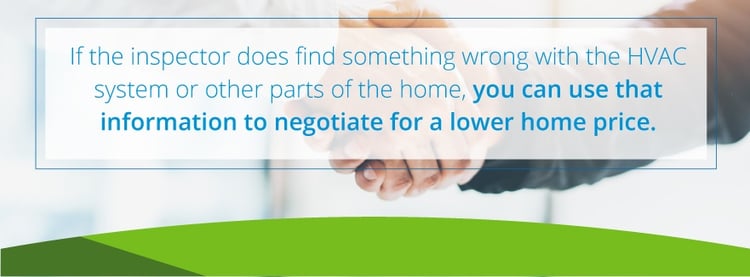
If the seller isn’t willing to negotiate on repairs or replacement of the HVAC system, you have the option to walk away from the home.
- Informed decision. With a detailed home inspection, you can look at the home’s overall condition to determine if you’re willing to take on the potential issues. Even if you go through with the purchase, the inspection makes you better prepared to deal with issues if they arise.
Prepare HVAC questions to ask the inspector to ensure you fully understand the system and its potential issues. Ask the inspector to give you an idea of how well the system functions, any issues it has and how soon it might need to be replaced. If you’re not sure what to ask, keep reading to determine the questions that matter.
What Type of System Does the Home Have?
The most basic thing to ask is simply what type of system the home has. A common type of system uses a forced air furnace for heating and a central air conditioner for cooling. Older homes may only have a furnace without central air. Other homes may use boilers or heat pumps.
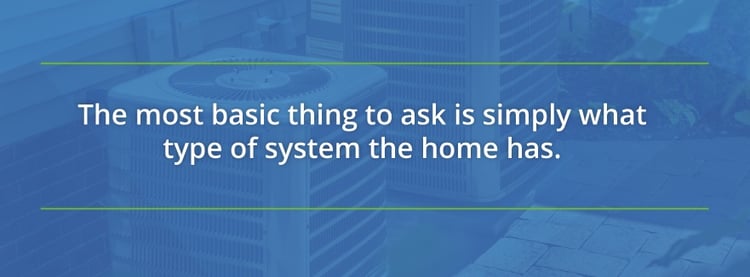
New homes or updated systems may have advanced HVAC features, such as a condensing furnace, scrolling compressor or electronically commutated motor. Radiant heating throughout the home is also becoming more prominent.
Some homes have a combined heating and cooling system, while others have separate heating and cooling systems. Other homes have a combination of systems. The home may have two different heating systems, for example.
Understanding the type of system helps you determine the type of maintenance required to keep it running. Advanced HVAC technology can improve efficiency and convenience, but it may also come with some drawbacks to consider. Local HVAC companies may not have much experience with those advanced systems, so you need to choose technicians carefully to ensure proper maintenance and repair.
Consult with an HVAC specialist if you’re confused about the current type of system and its potential pros and cons.
What Is the Power Source?
Another factor to consider is the power source of the system. Is the HVAC system electric? Is it gas powered? Will you need to purchase heating oil? Does the home have a geothermal system? Knowing the power source helps you plan for operating the system. You can research the costs of the specific power source in your area to estimate the costs.
How Old Is the System?
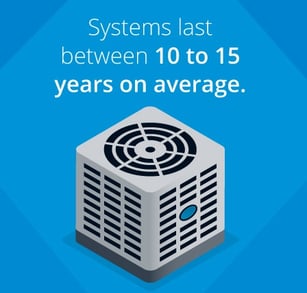 The age of the current HVAC system gives you an idea of how much life it has left and when you might need to replace it. Systems last between 10 to 15 years on average. That doesn’t mean you should automatically run away from a home with a furnace in or nearing that range. Age isn’t the only factor in the longevity of an HVAC system. Maintenance over the years has a major impact on how long the system lasts.
The age of the current HVAC system gives you an idea of how much life it has left and when you might need to replace it. Systems last between 10 to 15 years on average. That doesn’t mean you should automatically run away from a home with a furnace in or nearing that range. Age isn’t the only factor in the longevity of an HVAC system. Maintenance over the years has a major impact on how long the system lasts.
If the current system is nearing the 10 to 15-year range, it’s important to consider the potential impact. You may need to replace it soon or pay for potentially expensive repairs as parts start to fail. A total replacement typically costs thousands of dollars, so make sure this is an investment you are ready to make. You have the option of asking the seller to replace the unit or paying for part of the costs.
The age of the system also plays a role in energy efficiency. Older units tend to use more energy, which is bad for the environment and your bank account. Newer systems tend to be more energy efficient. You won’t use as much energy, and your utility bills are lower.
Older systems may cost you more when you need to replace the refrigerant. Older units often use Freon, which is being phased out. You may have difficulty finding Freon if your refrigerant runs low. When you find the replacement refrigerant, it will likely cost more, with the price increasing as it becomes more difficult to find. Keep this extra cost in mind if the existing system uses Freon.
Who Installed the System?
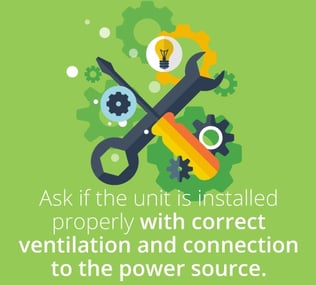 Find out the name of the company who originally installed the HVAC system in the home. Do a little research on the company to ensure they are reputable. Proper installation is important not only for the efficient operation of the unit but also for the safety of your family. Improper installation can cause potential hazards, such as gas leaks, CO leaks or fire risk.
Find out the name of the company who originally installed the HVAC system in the home. Do a little research on the company to ensure they are reputable. Proper installation is important not only for the efficient operation of the unit but also for the safety of your family. Improper installation can cause potential hazards, such as gas leaks, CO leaks or fire risk.
During the home inspection, ensure the inspector looks at the installation. Ask if the unit is installed properly with correct ventilation and connection to the power source. Inquire about the ductwork in addition to the furnace and central air unit.
What Is the Maintenance History of the Unit?
Regular maintenance is important in keeping any HVAC system running efficiently. That maintenance also extends the life of the unit, which saves you money over time. Systems with regular, professional maintenance often outlast the 10 to 15-year average lifespan.
You can get an idea of how well the previous owner has cared for the unit by asking about the maintenance history. How often do they service the unit? Do they get routine checkups, or do they only call for service when they have an issue? The common recommendation is to have an inspection just before winter and again just before summer.
If the owner had an inspection before selling but hasn’t handled routine maintenance over the years, proceed with caution. The lack of routine care may decrease the lifespan of the unit, forcing you to repair or replace it soon. Infrequent maintenance adds to the wear on the unit and may allow small problems to grow into major issues.
Is There Documentation From Previous Servicing?
A home inspector can give you a general idea of the system’s condition, but documentation from an HVAC specialist tells you more about the system. Seeing the documentation from maintenance appointments lets you read any notes left by the technician, which can provide clues about potential problems. You can learn more about past repairs made to the unit. The documents give you verification that the unit was serviced as the owner says.
Note the companies who handled the maintenance and repairs. Are they reputable companies known in your area for providing quality work? Did the homeowner consistently use the same company, or did they use a different company each time?
If you follow through with the home purchase, having the documentation comes in handy for future maintenance and repairs. The service technician can look back at that paperwork to see what has been done in the past. The paperwork can reveal a pattern of problems, which can help predict the current problem or potential future problems.
What Are the Average Heating and Cooling Costs?
Utility bills can vary significantly from one home to the next. Asking about the average amount of utility bills helps you plan for the expense if you go forward with the purchase. The utility company can often give you information on the average utility bills.

It’s also a good idea to look at the costs during different times of the year. Bills tend to be higher in the summer and winter months when heating and cooling demands are the highest. Exploring those peak costs helps you plan for spikes in your utility bills.
If the bills seem excessive for the size of the home and the area, it could be a red flag. Consistently high bills may indicate a problem with the efficiency of the system or the home. It could mean the system isn’t working properly or runs more than normal. The high bills could also mean the home lacks insulation and proper sealing. Investigate further if the bills seem higher than you expect.
Is There a Warranty Still in Place?
Check with the current owner to determine if the system still has a warranty in place. If the HVAC system currently has a warranty, verify the coverage continues when the ownership of the home changes. Some newer units come with lifetime warranties, but those warranties typically end as soon as the home sells. Others may continue for a short period after the sale.

Ask for documentation related to the warranty if it will remain in effect after the purchase. Check the terms and conditions of any warranty that will continue after you buy the home. Determine what the warranty covers as well as any restrictions or things that aren’t covered.
Does the System Work Well?
If you have the chance to talk to the current owner, ask how well the system seems to work. Inspections can give you an idea of potential problems and the expected quality of operation, but talking to the person who uses the system can give you a good look at the operation on a practical level. Ask how well the system heats and cools the home, as well as whether the house tends to have wide fluctuations in temperature between rooms.
Is the System Properly Sized for the Home?
HVAC systems come in various sizes based on the size of the home. A unit that is too small for the home’s size can’t keep up with the heating and cooling demands. The unit runs more than normal yet never seems to reach the desired temperature. This can cause extra wear and tear on the unit and an increase on your utility bill.
A larger-than-necessary unit may not seem like a problem, but it can cause just as many problems as a small system. A unit that is too large for the home isn’t energy efficient, which costs you more money. The system may cause large temperature swings because it can’t effectively reach and maintain the temperature you set on the thermostat. An oversized system may run for shorter periods of time.
When this happens, the system can’t effectively dehumidify the air because it doesn’t run long enough. That excess moisture can make the home feel uncomfortable. It can also create ideal conditions for mold and mildew growth, which can cause health issues.
The ductwork is another component of proper sizing. Ductwork that is too large decreases the air flow and forces the unit to work harder to heat and cool the home. You may notice hot or cold spots throughout the home or uneven cooling in different rooms or on different levels. You’ll likely notice higher utility bills, and the HVAC system may wear out sooner due to the extra work.
Ductwork that is too small also causes the unit to work harder than necessary, which wears out the motor. You may notice the same uneven heating or hot and cold spots with higher energy bills.
During the home inspection, ask questions about the size of the unit. The inspector can tell you if the HVAC system is too small or too large for the home size. Ask about the size of the ductwork to ensure it can handle the airflow and demands of the system.
Is the Home Well-Insulated?
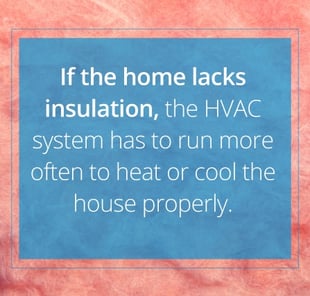 Insulation isn’t considered a part of the HVAC system, but it does play an important role in helping the system operate efficiently. If the home lacks insulation, the HVAC system has to run more often to heat or cool the house properly. That high demand adds wear to the system and increases your utility bills significantly.
Insulation isn’t considered a part of the HVAC system, but it does play an important role in helping the system operate efficiently. If the home lacks insulation, the HVAC system has to run more often to heat or cool the house properly. That high demand adds wear to the system and increases your utility bills significantly.
If the home seller doesn’t have information on insulation, check with your home inspector, who may have some techniques to check for insulation. One potential indicator of poor insulation is a vast difference in temperature from one room to another. This temperature difference is often easiest to feel in the winter months, when one room may feel cold while another is warm.
Are the Windows and Doors Sealed Well?
Just like insulation, seals around the windows and doors are important in helping the HVAC system operate efficiently. Drafty windows with lots of leaks let in outside air and let the heated or conditioned air escape the home. Those leaks cause the system to work harder to achieve the desired interior temperature.
On a windy day, you can often feel the air blowing in through gaps and leaks. Another way to test the seal is by using an incense stick. A steady stream of smoke from the incense stick indicates a good seal. Movement of the smoke could indicate a leak.
The age of the windows and doors can also be an indicator of how well they work. Older windows tend to be much less energy efficient with a higher risk of leaks and poor seals.
How Efficient Is the System?
You can guess whether the system is energy efficient based on the age, but asking specific questions about energy efficiency gives you a better idea of how well the system works. As a general rule, newer systems operate more efficiently. If the owner doesn’t have energy efficiency information, look on the system’s label for the information.
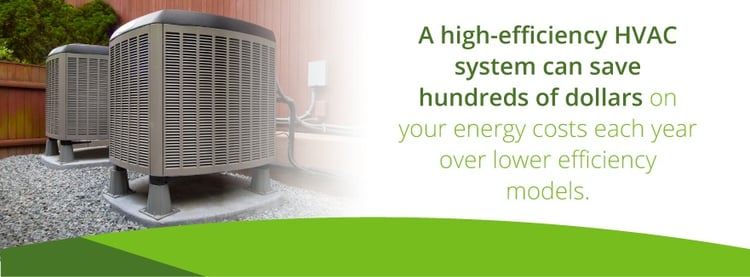
If this information is missing, look up the brand and model for the unit to get general energy-efficiency information. An Energy Star rating is also an indicator to look for to determine if the system is efficient. A high-efficiency HVAC system can save hundreds of dollars on your energy costs each year over lower efficiency models.
Are There Physical Signs of a Problem?
Your home inspector should notify you of any physical signs of problems with the system. This includes rust, decay, watermarks and similar issues. If you notice something seems odd, ask the inspector if what you see is normal or if it indicates a potential problem. Listening to the system run also helps find potential problems. Listen for bangs, knocks or other strange noises.
The furnace and central air units aren’t the only areas that can show signs of problems. Inspect any exposed duct work to look for rusting, gaps or other potential problems. Properly sealed ducts help the air throughout the home flow more efficiently for better operation.
HVAC questions for buying a home help you spot problems before you purchase. This information lets you negotiate on price, request a replacement system before buying or decide to walk away from the purchase. Once you purchase your new home, check our prices and order heating oil to power the system. Contact us for more information on saving money on quick heating oil deliveries.


